First published by Investor.ge
When the American Chamber of Commerce was founded 25 years ago, Georgia was a very different place than what it is today. Only four years earlier, the end of the war in Abkhazia had seen the Georgian economy decline to 20% of the level it had been a decade before. No other country in the region had declined as far or as fast. By 1998, natural gas was in short supply, electricity and water-supply were intermittent, and corruption was rampant.
Nonetheless, a few hardy US investors were increasingly looking to invest in the country. This created a problem for the then US Ambassador Kenneth Yalowitz. The US wanted to support American businesses, but Georgian political pressure, criminality, and outright corruption made regular business impossible. As Ambassador Yallowitz previously explained to Investor.ge, “When I got to Georgia, the corruption was very intense. Things were very, very bad. There were some American companies working in the country but as soon as they became even close to profitable, they were usually beset by either tax authorities or individuals demanding ownership.”
As a result, he says, “It was always extremely difficult for American companies, and I spent a fair amount of my time going to the Ministry of Economy and talking to the president and ministers on their behalf. I really felt that an organized AmCham would be a very powerful addition to what I was trying to do. Having a business organization for American firms would enable them – instead of fighting all these battles individually – to come together and lobby.”
At the time, the US Embassy was already holding monthly business roundtables with companies to discuss trading problems arising across the country, and to brief embassy staff on what businesses were experiencing on the ground. The idea was conceived to build on this and add Georgia to the international AmCham network.
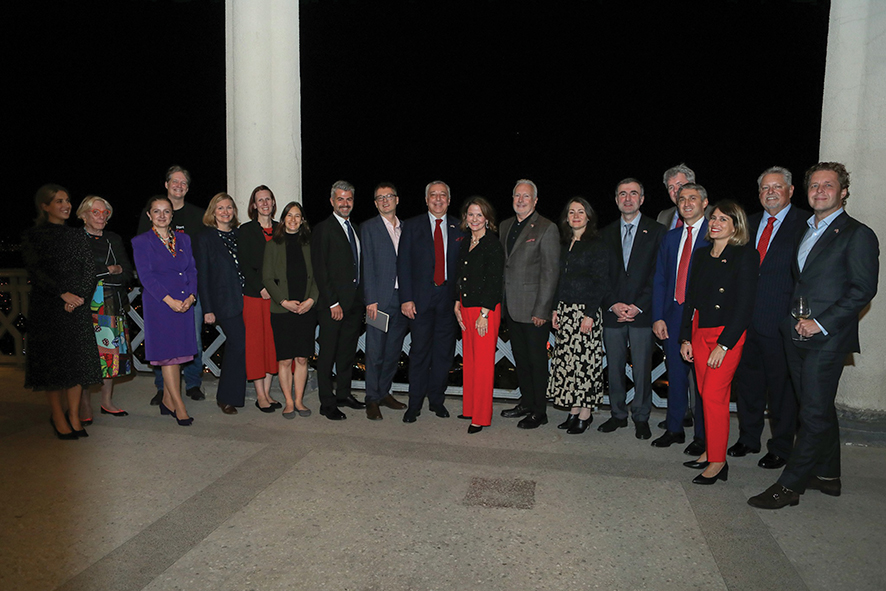
Organizing AmCham Georgia
First, the Ambassador faced the task of enrolling local companies. So he turned to two prominent members of the American business community, Betsy Haskell and Leigh Durland. Haskell had established Betsy’s Hotel in 1994, encouraged to do so by Ambassador Yalowitz, and Durland was in charge of Absolute Bank, one of the first privately-owned banks in Georgia, which had been founded with investment from former US Secretary of State and Treasury Secretary James Baker.
They recruited an American working in Georgia’s NGO world, Amy Denman, to push the effort forward. “When Leigh approached me,” Denman says, “he told me ‘I don’t know if this is going to work, but we need someone like you to get behind it and give it a try.’ It sounded like good fun to me. So, I turned down a few other safe, well-paid job offers in the humanitarian aid arena to give it a go.”
The start was inauspicious; there was no office or staff. Denman started working from her kitchen, driving around Tbilisi in her Niva and selling the idea of a business association based on American standards and ideals.
Betsy Haskell says that at the time, AmCham’s founders wanted to create a standard for businesses operating in the country. “We wanted to represent the way that Americans do business,” she says, highlighting the chamber’s notable success in “demonstrating the appropriate way to operate as a business” and “that process and legal remedies work.”
At the start, “the idea was to approach the government bilaterally, from the embassy on one side and the chamber on the other side. The idea was to lobby for the investment climate, to lobby for the international companies operating here,” explains one of the founding business members, Fady Asly, who had run into problems very early on in his import business’ (Agritechnics) time in Georgia.
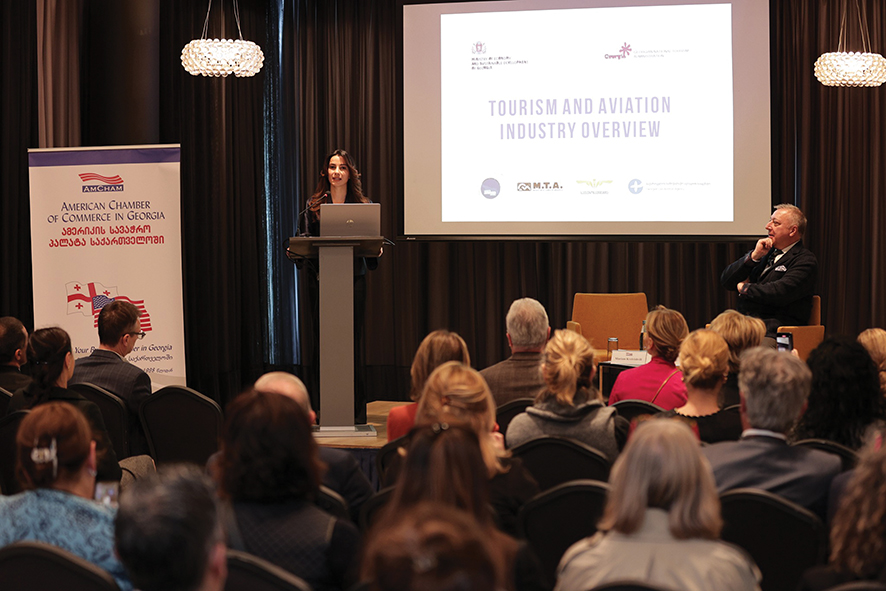
Asly was persuaded to join and went on to serve as president for eight years. Several others voiced interest, and so AmCham Georgia was launched. Haskell supported the nascent effort by paying the $385 registration fee out of her own pocket, and Denman started looking for more members. Very soon, fifteen inaugural members were recruited – principally American in the early stages – and AmCham Georgia was on its way.
Founding members in addition to Durland, Haskell, and Asly were Sante-Walsh (owned by US entrepreneur Bob Walsh) and, through a local subsidiary, oil major BP. The international oil giant first came to Georgia in 1996, when plans were laid for the Baku-Supsa pipeline, and has continued to give support throughout AmCham Georgia’s history, acting as a Patron Member and having its officers serve as directors.
AmCham was officially established in November 1998 and held its first General Assembly in 1999 at the Sheraton Metechi Palace Hotel. The leading members that were to guide the development of AmCham Georgia were soon in place. It began to take a leading role in shaping the business environment, helping the economy grow, and attracting foreign investment.
Irakli Baidashvili, the current AmCham President, first became connected to the chamber through founding company Sante-Walsh. He explains that in the early days, “we all saw that AmCham was a mechanism for coming together and standing up for one another. This was vital in such difficult times.”
Sarah Williamson, whose digital technologies business UGT joined AmCham in 1999, and who went on to be AmCham President for three two-year terms, says, “Shortly after I joined, I realized that AmCham was going to have a lot of responsibility in creating the basis for the business environment going forward, and I wanted to be part of it.”

Describing the modus operandi of AmCham in those first days, Denman says: “One important role in our early years was to be very vocal about how deep and how widespread the problems were and to start drawing attention to begin to address them. AmCham wrote about the issues, held press conferences, and kept in close liaison with the US and other embassies. People we met would nod and say ‘we know, we know,’ so we would start having meetings and calling for change.” Denman would go on to serve as AmCham’s executive director until leaving for the US in 2015.
Growth and professionalization
Having been born in a time of great adversity for businesses, AmCham quickly sought to professionalize. At the core of its activity was always the AmCham Board of Directors. The board is fully elected by the membership, with term limits on its presidency. Board members are very active, meeting monthly and attending AmCham events and bi-annual planning meetings. As Michael Cowgill, who is currently first Vice President and served as President for two terms, said of the board:
“The AmCham board really is at the core of AmCham’s management. As elected board members, they are confident that they can make decisions that align with members’ inclinations and interests. As long-standing business professionals, they also bring a plethora of experience and expertise to the table.”
The change of government with the 2003 Rose Revolution brought regular discussion with the new Georgian president and his officials on what the business community needed. AmCham’s suggestions for desirable reforms had long included taxation, and as the organization became more issue-oriented, committees were formed. AmCham’s work on the tax code, labor code, customs, and other areas of corporate governance were, and continue to be, conducted with the support of committees.
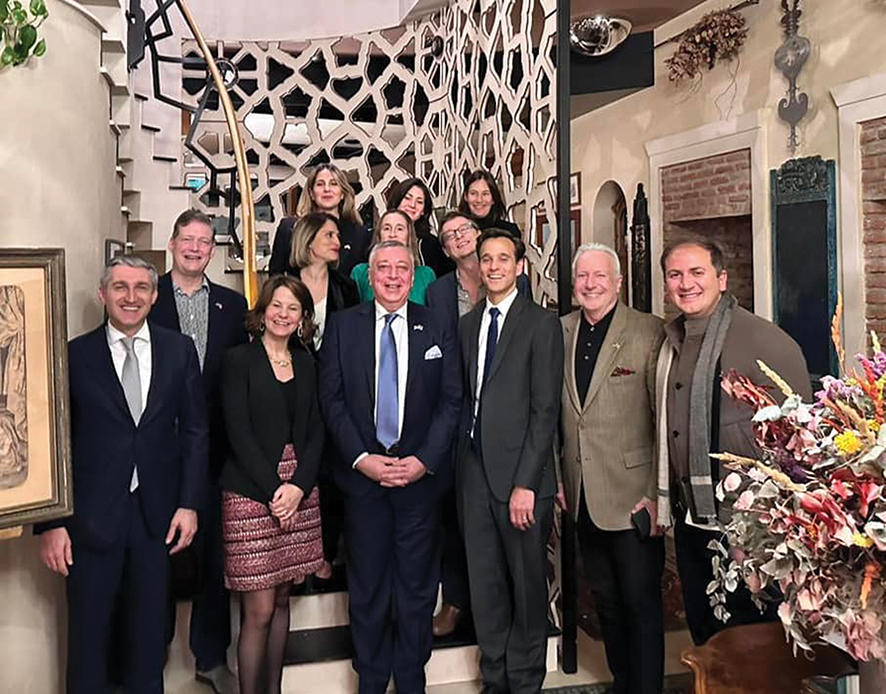
As Irakli Baidashvili told Investor.ge, “Committees are valuable because they provide a huge amount of pro-bono expertise. Committee members also work in the affected sectors, so they have a better understanding of the practical change that is needed more than anyone else. Also, their years of expertise bring credibility to discussions.”
AmCham currently has the following committees:
The Commercial Law and Tax Committee, which has supplanted the previous tax committee to work as the key focal point for corporate, tax, and legal changes. Ongoing work includes the labor code and the law on entrepreneurs.
The Environmental Committee, which has worked on extended producer responsibility and recycling and waste reduction. It also works with other NGOs to develop this space.
The Education and Training Committee, which has been focusing on how to improve international education in Georgia by refining the regulatory and visa rules for foreign students.
The Tourism Committee, which just finished a large USAID financed-project that aimed to improve the hospitality standards of hotel staff and increase the attractiveness of working in the sector in the aftermath of Covid.
The Agricultural Committee, which has worked on developing exceptions to the ban on foreign ownership of agricultural land to allow for increased investment in the sector.
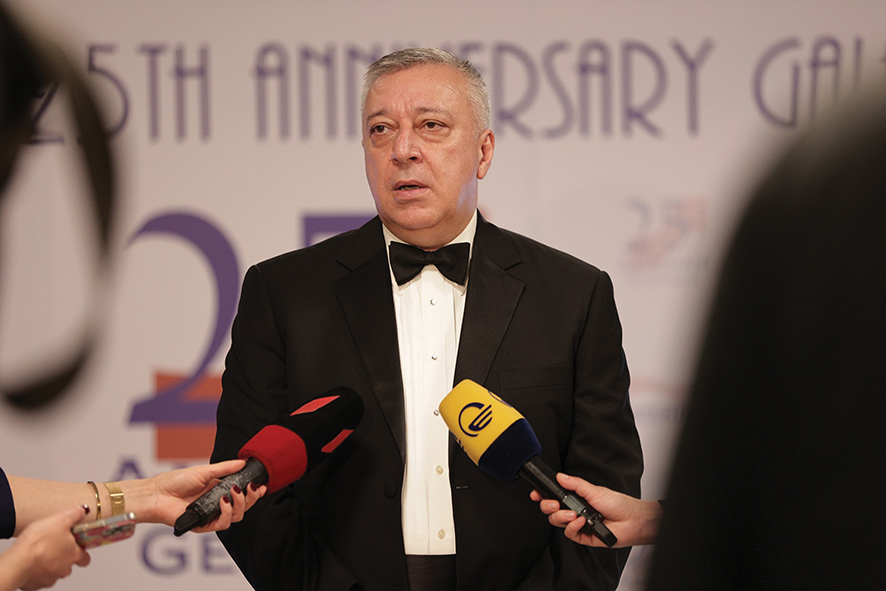
The Construction and Real Estate Committee, which has engaged with the government on building and construction regulations.
The FMCG Committee, which has worked on packaging and food standards rules.
The Technology and Entrepreneurship Committee, which works to keep companies and investors connected to opportunities in the start-up space.
In recent times, these committees have proved invaluable in facilitating discussions of EU orientation that followed the signing of the Association Agreement in 2014. As AmCham Executive Director George Welton tells Investor.ge, “While AmCham’s driving logic has always been towards the United States, AmCham has also always been a keen supporter of Georgia’s EU aspirations. We understand that EU-integration is one of the best tools for Westernization of the business environment generally, and that is one of our key goals.”
This effort, as AmCham President Irakli Baidashvili points out, also falls directly in line with the chamber’s aspirations of creating a thriving business environment in the county. “We are big supporters of EU integration. But, as a business association, we have always been keen to ensure that the process of EU alignment is as pro-business as possible.”
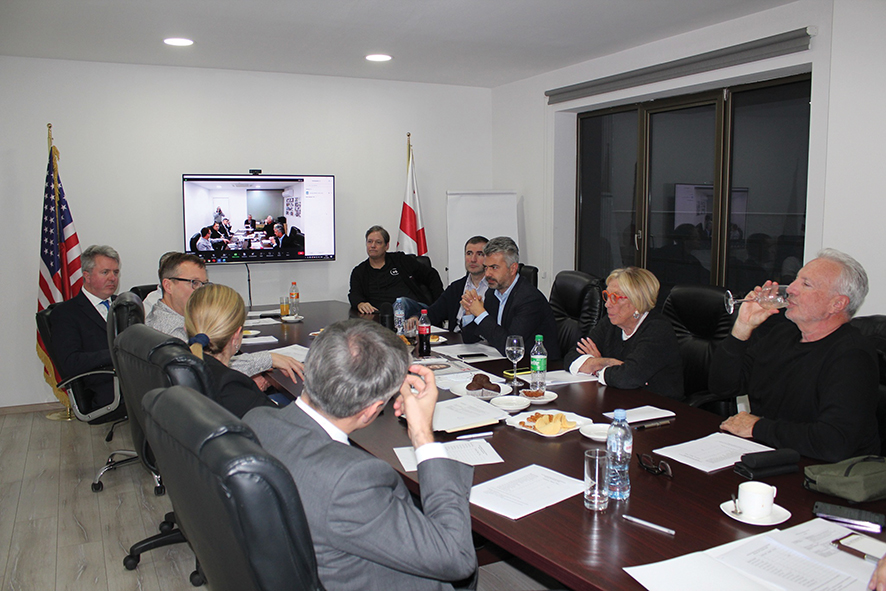
AmCham has also supported its members in the face of new challenges. During the Covid-19 pandemic, for example, AmCham was an important lifeline for the business community, helping members adapt to the rapidly evolving situation and advocating on their behalf for support from the government.
Michael Cowgill, who was serving as AmCham President when the pandemic began, recalls: “Probably the most notable aspect of my terms as President was that the Covid pandemic hit during my last year in office. This was unlike anything any of us had ever encountered or foreseen. I would like to think that together with the Board and dedicated staff, we led the Chamber through the first critical year of the pandemic. We set the way forward, ensuring that in such an unfamiliar circumstance, AmCham continued to grow and remain a relevant and beneficial organization for our members and the larger Georgian economy.”
Much like it did during Covid, AmCham also continued to support its members after Russia invaded Ukraine in early 2022. When the war began, for example, FMCG companies wanted to stop sourcing their products from Russia, but EU factories were not equipped to provide Georgian language labels. AmCham intervened so that these companies received a six-month labeling exemption from the Georgian authorities while they made the transition.
Policy dialogue has also been supported by the Investor Council, which brings together the most influential business associations in Georgia, the international financial institutions, and the key economic components of government. AmCham developed the idea of the Investor Council over several years and was one of its founding members in 2016. Since its inception, Investor Council meetings have been held once per quarter and always chaired by the Prime Minister, with support from a Secretariat and financing from the British Government.
Furthering Georgia-U.S. relations
Perhaps AmCham’s most important lever for facilitating change has been its Americanness. As AmCham President Irakli Baidashvili told Investor.ge, “Much of our influence comes from our strong relationship with the US Embassy and the US government, more broadly. This is important not just because successive Georgian governments have understood the importance of the U.S.-Georgia bilateral relationship, but also because the US and Americans are hugely popular amongst the wider Georgian population.
Georgians have always known that we have no stronger partner in the world than the US. That has been particularly important to remember during our current challenging times.”
One part of this connection is with the US Embassy in Tbilisi. As Baidashvili notes, “the US Ambassador has always been our honorary President and the embassy sits in on our monthly board meetings. Also, we maintain strong links with the embassy during official US visits, with regular engagement between the Ambassador and our members during social events like the 4th of July picnic we co-host for 2,500 guests on US Embassy grounds. I don’t know any other country where that happens.”
AmCham Georgia has also taken several trips to the US to engage with congressmen and other state officials directly, as well as hosting senior delegations in Georgia. Most notably, immediately following the war in 2008, AmCham was among the first to meet with the interagency delegation that laid the groundwork for the country’s $1 billion aid package.
More recently, AmCham met with President Trump’s National Security Advisor John Bolton during difficult discussions regarding Iran, as well as then Secretary of State Mike Pompeo during a visit to Georgia; they also met with the US government sanctions team on their multiple visits overseeing US sanctions against Russia. The chamber has continued to engage with the US government’s team overseeing the region to discuss regional economics, security, trade, and much more.
On top of this, AmCham continues to innovate and look for ways to widen its impact. In the last few years, AmCham completed a large USAID-funded training program to increase hospitality standards and highlight the attractiveness of careers in the hospitality sector. The chamber is about to start a program to highlight the importance of foreign investment to Georgia, and it also launched a scholarship program to support 30 students from disadvantaged backgrounds to go to university.
Of course, with the war in Ukraine, the conflict in Israel, other regional conflicts, and unstable politics across the world, Georgia is facing dramatic challenges once again. At the same time, with its recommendation for candidate status in the EU, the country is also facing huge opportunities. So, on its 25th anniversary, as AmCham President Baidashvili said, “Right now, we face huge challenges, but the last 25 years have taught us that the AmCham network is a considerable force for positive change. Therefore, our best chance for a better future is if we face it together. With that thought in mind, I look forward to the next 25 years.”
By the Investor.ge team














